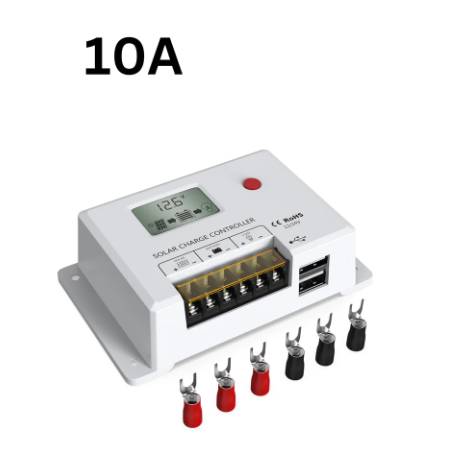In the realm of renewable energy, solar power stands out as a clean and sustainable source of electricity. To harness the power of solar panels effectively, a crucial component is the PWM (Pulse Width Modulation) Solar Charge Controller. This device plays a vital role in regulating and optimizing the charging process for batteries connected to solar panels. Let's delve into the functionality, benefits, and features of PWM Solar Charge Controllers.
How PWM Solar Charge Controllers Work
Regulating Solar Power: PWM Solar Charge Controller electricity, which fluctuates based on sunlight intensity. The PWM Solar Charge Controller acts as an intermediary between the solar panels and the battery, ensuring that the battery receives the optimal charging voltage and current.
Pulse Width Modulation (PWM): PWM controllers regulate the charging process by rapidly switching the connection between the solar panel and the battery. This modulation technique ensures that the battery receives a steady and controlled charging current.
Battery Protection: One of the primary functions of a PWM controller is to prevent overcharging and deep discharging of the battery. It monitors the battery voltage and adjusts the charging current accordingly, extending the battery's lifespan and efficiency.
Benefits of PWM Solar Charge Controllers
Efficient Charging: PWM controllers optimize the charging process by delivering a constant voltage to the battery, ensuring efficient and timely charging.
Battery Longevity: By preventing overcharging and deep discharging, PWM controllers help extend the lifespan of the battery, reducing the need for frequent replacements.
Improved System Performance: A properly sized and configured PWM controller ensures that the solar power system operates at its maximum efficiency, maximizing the energy harvested from the solar panels.
Cost-Effective: PWM controllers are relatively affordable compared to other charge controller types, making them a cost-effective choice for small to medium-sized solar power systems.
User-Friendly Operation: These controllers are easy to install and operate, with simple settings for voltage regulation and battery type selection.
Features of PWM Solar Charge Controllers
Voltage Regulation: PWM controllers maintain a constant voltage output to the battery, ensuring optimal charging conditions.
LED Indicators: Many PWM controllers feature LED indicators to display battery status, charging mode, and system operation.
Temperature Compensation: Some advanced PWM controllers come with temperature sensors to adjust charging parameters based on temperature variations, enhancing battery performance in varying environmental conditions.
Load Control: Certain PWM controllers offer load control capabilities, allowing users to connect and power DC loads directly from the controller.
Multiple Battery Support: Some PWM controllers are designed to support multiple batteries connected in parallel, providing flexibility for expanding solar power systems.
Installation and Usage Tips
Proper Sizing: Ensure that the PWM controller is appropriately sized for the solar panel array and battery capacity to optimize charging efficiency.
Correct Wiring: Follow the manufacturer's instructions for wiring connections, ensuring that the solar panels, battery, and controller are connected correctly.
Regular Maintenance: Periodically check the controller for any signs of damage or loose connections. Clean the controller and solar panels to maintain optimal performance.
Battery Type Selection: Most PWM controllers allow users to select the battery type (such as gel, sealed, flooded) for optimal charging characteristics.
Conclusion
A PWM Solar Charge Controller
serves as a crucial component in solar power systems, regulating the charging
process to ensure efficient and safe operation. By effectively managing the
flow of electricity from solar panels to batteries, these controllers optimize
energy harvesting while protecting the battery from overcharging and deep
discharging. With benefits such as improved battery longevity, system
performance, and cost-effectiveness, PWM controllers are an essential tool for
maximizing the benefits of solar power. Whether for residential, commercial, or
off-grid applications, a well-chosen PWM Solar Charge Controller plays a vital
role in the efficient utilization of solar energy.
For more info. visit us:





Comments